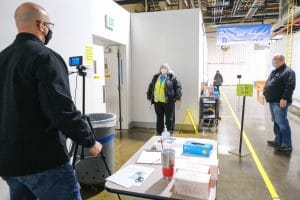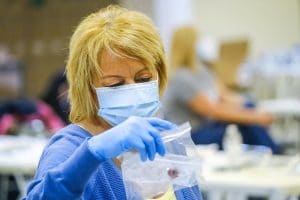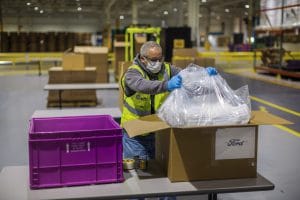
GM will used what it’s learned from building ventilators to help prevent the spread of the coronavirus once plants restart.
(This story has been updated to show Honda is now set to open its U.S. plants on May 11.)
Yet again, Detroit’s Big Three automakers are planning to push back their launch of production as the country slowly begins to emerge from the lockdown created by the coronavirus pandemic.
General Motors, Ford and Fiat Chrysler all are signaling a delay in their reopening plans to May 18. They previously expected to begin phased-in start-ups on May 4. Separately, Tesla on Sunday signaled to workers at its Fremont, California assembly plant that it will not have them report to work on Wednesday, April 29, as it originally had announced.
The decision by GM, Ford and FCA to delay their production plans appears to have been influenced by several different factors, including the extension of Michigan Gov. Gretchen Whitmer’s stay-at-home order through May 15. The automakers have also heard from workers worried about plans to keep them safe once plants do re-open. United Auto Workers President Rory Gamble raised concerns of his own about reopening plans last week.
(Tesla pushes back restart of California plant.)
“It is important that our employees feel confident that all precautions have been taken to ensure our facilities are safe, secure and sanitized when production resumes,” FCA said in a statement. “In light of the updated state stay-in-place orders, the company is re-evaluating its plans to resume its North American operations and will communicate new restart dates in due course.”

When workers return to GM, Ford and FCA plants, they’ll likely be wearing face masks and gloves as part of their required equipment.
The auto industry has been slammed by the global pandemic which first struck in China forcing a quick shutdown of automotive production across much of that country. As the coronavirus spread past China’s borders chaos followed, first leading to the closure of European parts and assembly plants and then, by mid-March, forcing the shutdown of the North American automotive manufacturing network.
Sales, in turn, also went into freefall. Though the plunge was somewhat less than originally forecast, U.S. new vehicle demand was nonetheless off by about 45% during the first 19 days of April compared to year-ago levels, J.D. Power reported last week, relying on data from thousands of dealers across the U.S.
That has left dealers across the U.S. with bulging inventories of most unsold products and, with Power not anticipating any significant resurgence of demand until June, at the earliest, automakers have a little bit of leeway in terms of reopening operations.
As with shelter-in-place orders and other efforts to deal with the coronavirus pandemic, how the auto industry resumes production will depend on a variety of factors, including individual brand strategies as well as where their plants are located. With southern states generally relaxing lockdown rules first, that plays out for foreign-owned brands to move first.
Kia, Mercedes-Benz and Volkswagen all brought workers back on Monday, April 27. BMW is planning to open the doors of its South Carolina plant on Friday, May 1, and Volvo, Hyundai and Toyota are looking to follow three days later. Honda, Nissan and Subaru have set mid-May targets.

JoAnn Ritchie, a 30 year UAW-Ford employee at Van Dyke Transmission Plant, built face masks, will likely be comfortable with the new protocols.
(GM moving forward with preparations to restart plants.)
With their own production networks largely based in Michigan and other parts of the Midwest, Detroit’s automakers could be the last to reopen on May 18. The extension of Michigan’s executive order was one of the factors, Whitmer declaring nonessential businesses need to remain closed through May 15.
But the automakers also have felt strong pushback from workers worried about the ability of manufacturers to prevent new outbreaks in their plants. Hundreds of employees were stricken by COVID-19 by the time the production network shuttered in March.
That includes Julie Classen, a veteran line worker at Ford’s Michigan Assembly Plant, who is just recovering. Classen has already been shown some of the steps Ford plans to take while she agrees it will help to “space out the jobs more” so there is less likely to be direct person-to-person contact, she still has “a hard time believing they’ll actually make it safe enough.”
Classen’s concerns were echoed last week by the UAW’s Gamble who issued a cautionary note stating, “At this point in time, the UAW does not believe the scientific data is conclusive that it is safe to have our members back in the workplace. We have not done enough testing to really understand the threat our members face.”
Industry officials insist they’re taking every measure possible to ensure worker safety. Among other things, they are reorienting
line work to maximize distance between employees who now will wear masks, gloves and other protective gear. During a webinar last week, Toyota officials noted they not only have reshaped cafeterias to enforce social distancing but also have put up plexiglas barriers between sinks in lavatories. And workers will have their temperatures taken before they can enter Toyota plants.
Nonetheless, Sean Suggs, the president of Toyota’s Mississippi assembly plant acknowledged, “There’s a really good chance we’ll have a positive case again.”
(Toyota reveals “flexible” plan aimed at safely starting to reopen U.S. plants.)
Even when automakers do get their plants up and running, operations are expected to start slowly, initially to let workers get used to the new layout and procedures. The industry will then have to get a sense of how the automotive market itself recovers in order to gauge how quickly to ramp up production.


Honda’s latest announcement has them reopening on May 11 – not May 1 as stated in the article.
Thanks for the catch. we used a report from J.D. Power but, as the just-posted piece on Toyota shows, pretty much every manufacturer is shifting to a later date.
I’ll correct this.
Paul E.